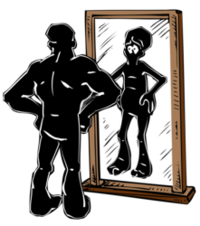Don’t Underestimate Your Attractiveness!

I wonder how many readers have ever been in a social setting and been a bit depressed by how good-looking everybody else seems to be? I’ve seen quite a number of people who by anyone’s standards were attractive individuals, but who were quite convinced that they were not.
At this point most proponents of pop psychology would jump in and say, “Well he’s got low self-esteem and we need to fix that.” They would probably recommend some exercise involving a mirror and telling him or herself how beautiful, attractive, valuable or special they are.
And they would be dead wrong.
This misperception about the attractiveness of other people is an evolutionary trick that will not be much helped by any number of affirmations.
A very interesting and well-executed study from the University of Texas will be published in next month’s issue of Evolution and Human Behavior. Sarah Hill, a psychologist in David Buss’ evolutionary psychology laboratory. Her research has shown that people of both sexes believe that the sexual competition that they face is stronger than it really is. She beieves that this is useful: it makes people try harder to attract or keep a mate.
What Sarah did was to show heterosexual men and women photographs of people. She asked them to rate both how attractive those of their own sex would be to members of the opposite sex, and also how attractive the members of the opposite sex were. She then compared the scores for the former with the scores for the latter, seen from the other side. Men thought that the men they were shown were more attractive to women than they really were, and women thought the same of the women.
She had predicted the outcome of the study based on a theory developed in the same laboratory by Martie Haselton and David Buss. It is called error-management theory: the idea that when people make errors of judgment hey always tend to make the error that is going to be least costly. Research has shown something to which many women can attest: men often tend to misinterpret innocent friendliness as a sign that women are sexually interested in them. Haselton and Buss reasoned that men who are trying to decide if a woman is interested sexually could err in one of two ways. They can mistakenly believe that she is not interested, in which case they will not bother trying to have sex with her; or they can mistakenly believe she is interested, try, and be rejected. Trying and being rejected comes at relatively little cost. However, form an evolutionary perspective, not trying at all could lead the major cost of not being able to spread their DNA around.
The theory is that there is an opposite bias in women’s errors: They tend to undervalue signs that a man is interested in a committed relationship. The evolutionary argument would be that if she guesses wrongly about a man’s intentions, she might have to raise a child on her own.
However, when it comes to assessing physical attractiveness, man and women make the same errors.
We always need to be a bit wary about pushing the perspectives of evolutionary psychology too far. I think that they are valuable, but that we can get into trouble if we apply their insights too liberally: humans are complex creatures who are continuing to evolve rapidly. We are different in every way from the people of a thousand years ago.
But this is a very useful insight into why some many people feel to see themselves as they are.
The moral of the story: have courage in initiating new relationships, and look at the whole person: physical, psychological, social, subtle and spiritual.
And don’t forget to use your intuition: the surest guarantor of making the right steps in relationships.
“I never saw an ugly thing in my life: for let the form of an object be what it may, light, shade, and perspective will always make it beautiful.”
–John Constable (English Landscape Painter, 1776-1837)






